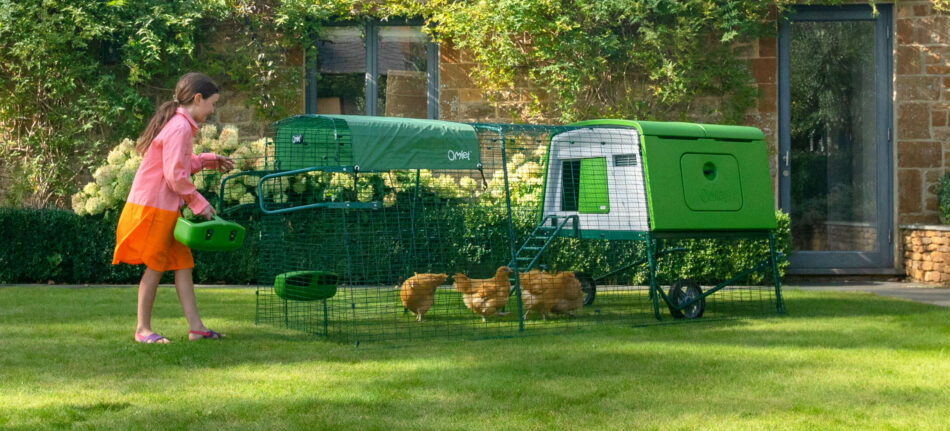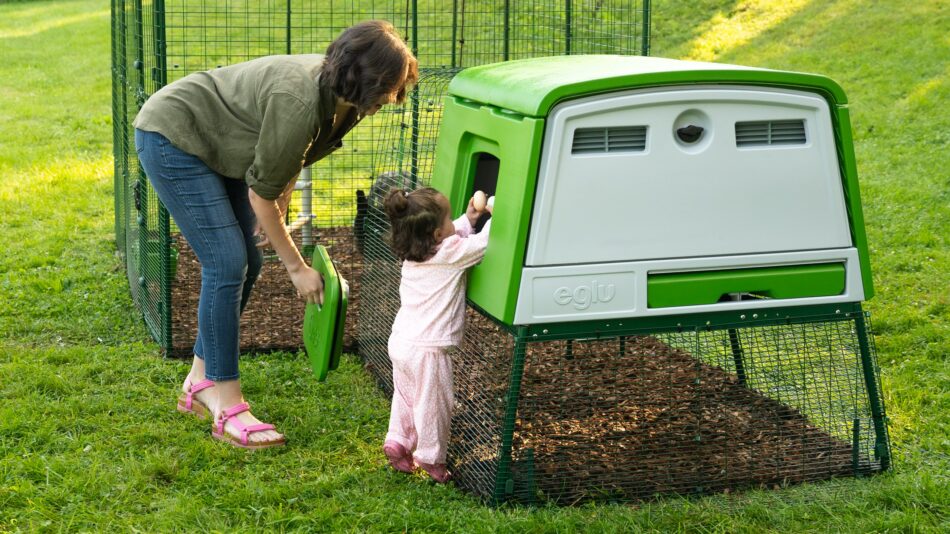Gardening tips for spring
Wondering if you can keep a garden and chickens? With these gardening tips for spring, you’ll be able to integrate your flock with your plants in a symbiotic way. With some preparation and protective measures in place, your hens can actually be a great help in the garden. Here’s how to keep your chickens and your plants healthy and happy this spring.
What do chickens do for my garden?
Chickens are excellent help in the garden as long as their roles — and boundaries — are clearly defined. With the help of chicken fencing to keep your hens away from prized or hazardous plants, your flock will happily forage to remove unwanted insects and weeds like clover or dandelions from your garden. They’re also excellent help with the compost, doing the daily turning for you and eradicating any insects that may be drawn to it.
In addition to pest control and help with the compost pile, you can supplement your chickens’ diet with fresh foods from your garden. By filling your flower beds with nutritious treats for your flock, you’ll boost their immune systems and overall health.
Planting for chickens
Chickens can eat a wide variety of vegetation — but as with humans and other animals, just because it’s good for other species doesn’t mean it’s safe for chickens. Familiarize yourself with chicken-safe plants, as well as plants that are toxic to them to create a flock-friendly garden that’s both beautiful and nutritious.
Chicken-safe plants
Most herbs are safe for chickens to eat, and often are the most beneficial in terms of immune-boosting and availability. For healthier hens, try growing:
- Basil
- Oregano – immune support
- Parsley – vitamin-rich
- Cilantro – a flock-favorite for taste
- Mint – cooling and calming effects
- Lavender – natural stress reliever
- Sage – antioxidant
- Rosemary – promotes respiratory health
These herbs can be served dried mixed into your flock’s feed, or fresh from the garden as a treat.
Other plants that are safe for chickens to eat include:
- Sunflowers (and their seeds)
- Nasturtium
- Dandelions
- Beebalms
- Clover
- Coneflowers
- Marigolds
- Daisies
- Roses
If you’re a vegetable gardener, here are some chicken-safe varieties:
- Carrots (especially the tops)
- Beet greens
- Broccoli
- Lettuces
- Kale
- Swiss chard
- Squashes
- Cucumbers
- Bell peppers
- Cabbage
And finally, some fruits are safe to feed to your flock, but they should be fed in moderation due to their fiber and sugar content:
- Berries
- Watermelons
- Canteloupes
- Grapes
- Apples (seeds removed)
- Stone fruits with pits removed
Plants toxic to chickens
While chickens can eat a diverse diet, there are some plants that are toxic to chickens. When keeping chickens near or in your garden, avoid planting:
- Rhubarb
- Tomatoes (underripe tomatoes are toxic to chickens)
- Potatoes (raw potatoes are toxic — sweet potatoes are safe)
- Foxglove
- Hemlock
- Rhododendrons
- Elderberry leaves
- Lilly of the valley
- Tulips
- Daffodils
- Morning glory
- Azaleas
- Ferns
- Tansy
- Amaryllis
- Trumpet vine
Other common foods and kitchen staples that you may toss out with your compost could pose a threat to your hens. Avoid letting your chickens ingest:
- Coffee grounds or tea
- Onions
- Avocados
- Apple seeds
- Citrus fruits
- Raw or dried beans
- Chocolate
- Sugary or salty foods
- Spoiled or moldy food
This is not an exhaustive list of plants and substances that are toxic to chickens, so always conduct thorough research or contact your veterinarian if you’re unsure about what to feed your flock.
What to plant in preparation for spring
Planting in preparation for the next season relies heavily on your Plant Hardiness Zone. Seed packets or plant inserts will usually give you an idea of when to plant them according to each zone and time of the year. As a general rule, avoid planting anything in the ground before the last anticipated freeze of the year.
You can easily start an herb garden in a windowsill or other sunny spot in your home. Use cuttings from a mature plant, or start from seeds to grow chicken-safe herbs in time for spring. You can also start seedlings for vegetables and some flower plants indoors before transferring them outside once the weather warms up.
Omlet and your flock
Whether your chickens have run of your garden, or are chicken run– adjacent, we have everything you need to foster a symbiotic relationship between your flock and your fauna this spring. From chicken-keeping essentials like chicken coops to modern accessories like an automatic chicken coop door, you can have your garden, and your chickens too. Discover spring gardening the Omlet way, and never compromise on either hobby.
This entry was posted in Chickens


